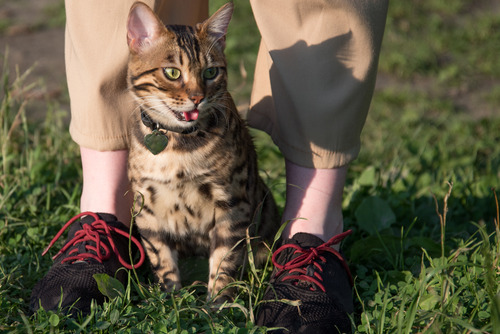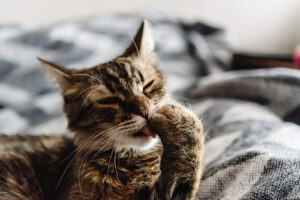Asthma is a common issue among cats, similar to humans, and can significantly impact their quality of life. Characterized by chronic inflammation of the small passageways in the lungs, cat asthma can lead to severe breathing difficulties if not properly managed. In this comprehensive article, we’ll explore the symptoms, diagnosis, and treatment options for cat asthma, providing essential information for pet owners. For personalized advice and treatment options, call Chino Valley Animal Hospital at (928) 636-4382 or request an appointment online.
Recognizing the Symptoms of Cat Asthma
Cat asthma can present a range of symptoms that may initially be mistaken for less serious conditions. Understanding these can help you catch the disease early and seek timely help.
Common Signs of Asthma in Cats
- Coughing and Wheezing: Frequent bouts of coughing or wheezing are typical signs, especially if your cat appears to be forcefully expelling air.
- Difficulty Breathing: Watch for increased effort in breathing, which might include open-mouth breathing or a hunched posture.
- Lethargy: Decreased energy levels or less interest in play can also be indicative of respiratory distress.
- Rapid Breathing: Increased respiratory rate can occur even when your cat is at rest.
If you notice any of these symptoms, it is crucial to consult with a veterinarian. Early diagnosis can prevent complications and improve the quality of life for your cat.
Diagnostic Approaches for Cat Asthma
Diagnosing cat asthma requires a combination of clinical examination and specific tests to rule out other conditions like heart disease or respiratory infections:
- Chest X-rays: These images help to identify any abnormalities in your cat’s lungs and airways.
- Blood Tests: These can check for signs of infection or inflammation indicative of asthma.
- Allergy Testing: Since allergens can trigger asthma attacks, identifying potential allergens is a critical step.
- Bronchoscopy: A more detailed examination involving a camera to view the airways can be beneficial for severe cases.
These tests are essential for confirming the diagnosis of cat asthma and should be performed by qualified professionals like those at Chino Valley Animal Hospital.
Treatment Options for Cat Asthma
While cat asthma is incurable, it can be managed effectively with medications and lifestyle adjustments to ensure your cat leads a comfortable life. Regular follow-ups with your vet are also necessary to adjust the treatment plan as needed and monitor your cat’s respiratory health.
Medication Treatments
Inhaled steroids reduce inflammation in the lungs and are often administered with a special inhaler. Bronchodilators can also help to open up the airways and may be used during asthma attacks.
Lifestyle and Environmental Management
Keeping your home free of dust, smoke, and strong odors can prevent asthma attacks. Minimizing stress is another way to reduce the risk of asthma attacks. Create a calm environment and try to maintain regular routines for your cat to help manage their asthma symptoms.
When to Seek Professional Help
Understanding when to seek immediate veterinary care can prevent emergencies and is a key part of managing cat asthma:
- Sudden Respiratory Distress: If your cat suddenly struggles to breathe, this can be an emergency situation.
- Persistent Coughing or Wheezing: When these symptoms don’t subside with usual treatment, professional help is needed.
In these cases, it’s important to contact Chino Valley Animal Hospital immediately. Prompt action can make a significant difference in outcomes for a cat with asthma.
Caring For Your Cat’s Asthma
Managing cat asthma is a commitment to your cat’s health and requires vigilance and attention to their environment and symptoms. With the right care and regular veterinary visits, cats with asthma can live full and vibrant lives. If you’re concerned about cat asthma or have noticed any of the symptoms mentioned, call us at (928) 636-4382 or schedule an appointment online to discuss the best care for your pet. At Chino Valley Animal Hospital, we are dedicated to providing your pet with the best possible care, tailored to their specific needs.





